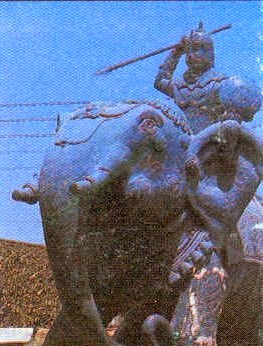* Alha of
the Banaphar
Rajput clan in the
Bundelkhand region of India was the famous general of the great Chandel King Paramdidev, or Parmal, who
fought Prithviraj Chauhan in 1182. Alha's mother, Devaki, was from
the Ahir caste. The Ahirs are considered
one of the oldest peasants in india.
* Alha had a sword given to him by Parmal, the ruler of Mahoba. The
sword was said to be from heaven and no weapon could match its fury. People who
listen to a recital of the Alha-Khand are filled with a warrior spirit and
fearlessness. They honour the code of the Kshatriya warriors and the courage shown in the
gruesome, difficult battles fought by them.
* Udal (Udai
Singh) was also a Rajput general in the army of Chandel King, Parmal of Mahoba in 12-13th century AD. He was younger
brother of Alha. Parmal raised Udal
as his own son, since he was born after the death of his father Dassraj, a general killed in the service of Parmal.
* Udal
was generally seen on a horse whereas Alha, on an elephant. Both were great
warriors of Bundelkhand. Out of total 52 battles fought by these Banaphar rajputs, Udal alone had won 22
battles. Alha
Udal bade ladaiya jinse haar gayi talwar (meaning
"Alha and Udal were such great fighters that even swords were defeated by
them"), the folklore of Alha and Udal,
is still sung in the heartland of Bundelkhand. According to folklore, Alha was
invincible, made immortal by the goddess Sharda. The shrine of the goddess is
at Maihar in Madhya
Pradesh (India). Alha
gifted his head to Sharda after cutting it off with a sword. The goddess,
extremely pleased by the act, made him immortal. Alha also had two maternal
brothers, Malkhan and Sulkhan. Malkhan had enormous strength, represented in
the sentence, "das das haathi bhuj par taule" (meaning "ten
elephants were weighed by him on one hand").
* The last battle fought by these great warriors was
when Prithviraj Chauhan declared war on Mahoba. During the
battle the Mahoban army was split into three different sections. One was led by
the Prince of Mahoba, while the other two were
led by the brothers, Alha and Udal. Chauhan defeated the sections under Udal
and the Prince. Udal had injured Pundir, a friend and general of Chauhan, in
combat. Udal moved forward and injured Chauhan so badly that he could hardly
move. Chauda Rai, in an attempt to save his friend Prithviraj, killed Udal in the
combat. Alha, commander of the third section, had seen Chauhan falling injured.
As soon as he moved forward to kill Prithviraj Chauhan, his guru Gorakhnath
came in the way. The guru forbade him not to take revenge of his brother's
death but to think for the welfare of the entire rajput state. Alha spared the
life of Chauhan and went to the Himalayas.
* In
the Bundelkhand region, Alha and Udal are worshipped as gods. In the poems that
are recited all over the region, when people sit around the fire and recite
these poems.
* It’s
indeed sad that their chivalry and sacrifice is little known outside the small
Bundelkhand region of India. When I see a movie like El Cid, made by the
Hollywood, I feel sad that Alha and Udal, who were greater warriors than the
Spanish military leader who went on to become a national hero, while Alha and
Udal have been abandoned by their own
nation. In today’s world when movies and TV spent thousands of hours on stupid
and frivolous programmes, none of the producers thinks of telecasting this
great story, or filmmakers make a movie on their lives.
* In
life they fought enemies, in death they fight anonymity. What a tragedy!! And
what a shame for the nation…………



No comments:
Post a Comment